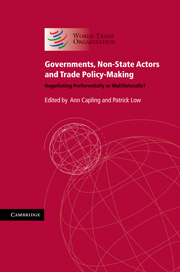Book contents
- Frontmatter
- Contents
- List of figures and tables
- List of contributors
- Acknowledgements
- Disclaimer
- Introduction
- 1 The domestic politics of trade policy-making: state and non-state actor interactions and forum choice
- 2 Chile
- 3 Colombia
- 4 Mexico
- 5 Indonesia
- 6 Thailand
- 7 Jordan
- 8 Kenya
- 9 South Africa
- 10 The influence of international non-state actors in multilateral and preferential trade agreements: a question of forum shopping?
- 11 Main findings and conclusions
- Index
- References
4 - Mexico
Published online by Cambridge University Press: 05 July 2014
- Frontmatter
- Contents
- List of figures and tables
- List of contributors
- Acknowledgements
- Disclaimer
- Introduction
- 1 The domestic politics of trade policy-making: state and non-state actor interactions and forum choice
- 2 Chile
- 3 Colombia
- 4 Mexico
- 5 Indonesia
- 6 Thailand
- 7 Jordan
- 8 Kenya
- 9 South Africa
- 10 The influence of international non-state actors in multilateral and preferential trade agreements: a question of forum shopping?
- 11 Main findings and conclusions
- Index
- References
Summary
In the last quarter of a century, trade policy in Mexico has undergone dramatic changes. After more than three decades dominated by an import substitution industrialization (ISI) strategy based on high trade barriers to protect the domestic market, in the early 1980s Mexico launched an ambitious process of trade liberalization. The levels of protection were reduced, first unilaterally, as part of the process of economic reform, and subsequently, through the negotiation of bilateral and regional preferential trade agreements (PTAs) with countries in North America, South America, Europe and Asia.
This chapter recounts the Mexican experience with trade liberalization and the role of non-state actors (NSAs) in influencing Mexican policy at the World Trade Organization (WTO) and in its PTAs. The chapter is structured as follows. Section 1 contains a brief overview of Mexico’s trade policy between 1982 and 2008 and a summary of Mexico’s trade patterns. Section 2 describes the main government and non-governmental institutions and actors involved in Mexico’s trade policy development. Section 3 summarizes the interaction between state and NSAs during the negotiating process of the North American Free Trade Agreement (NAFTA), the EU–Mexico Free Trade Agreement and the WTO. Section 4 contains an analysis of the perception by Mexican authorities and NSAs of trade policy developments based on interviews undertaken by the authors. Section 5 provides a brief overview of the core features of the dispute settlement mechanisms established under NAFTA, with a discussion of forum choice and an analysis of how these mechanisms have contributed to the interest and participation of NSAs in the development of trade policy. Section 6 concludes.
- Type
- Chapter
- Information
- Governments, Non-State Actors and Trade Policy-MakingNegotiating Preferentially or Multilaterally?, pp. 89 - 124Publisher: Cambridge University PressPrint publication year: 2010



